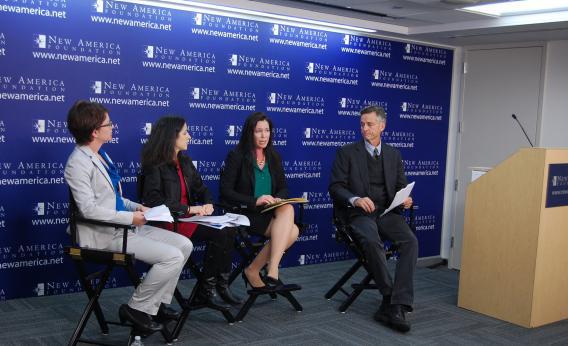Which presidential candidate would do the most to further scientific and medical research, technological advancement, and STEM education? Do their differing philosophies on regulation, government funding of R&D, and even the human role in climate change actually matter in the long run?
Those were the guiding questions at “It’s Science and Technology Policy, Stupid,” a Future Tense event held at the New America Foundation in Washington, D.C., on Tuesday.
The discussion began with a presentation from New America Foundation Bernard L. Schwartz fellow Konstantin Kakaes, who argued—as he recently did in a Future Tense piece for Slate—that politicians dramatically overestimate how much they can affect scientific and technological research. And contrary to the red-blue rhetoric that dominates so much of our political discourse, he said, neither party has a monopoly on science. Both Republicans and Democrats, for example, have backed boost-phase missile defense. But numerous studies—for example, an independent 2003 report from the American Physical Society—have said that the approach won’t actually keep Americans safe from missiles launched by enemies abroad. And in areas where we think that the parties diverge—for instance, fracking—Kakaes says that the differences aren’t actually as stark as one might expect. It’s a problem of being a politician instead of a scientist, of prioritizing today’s benefits over tomorrow’s potential problems.
Following Kakaes’ talk, panelists Sheri Fink, a Pulitzer Prize-winning investigator reporter and a medical doctor; Amanda Ripley, a contributing writer to Time; and Stacy Cline, counsel for Sen. Mike Enzi, Republican ranking member on the Senate Health, Education, Labor, and Pensions Committee, took the stage with moderator Robert Wright, a senior editor at Atlantic. (Ripley, Wright, and Fink are also fellows at the New America Foundation.) The group discussed how politics are shaping—or failing to shape—government funding of research, health care reform, education, and technology policy.
Cline agreed with Kakaes that in many ways, Republicans and Democrats share ground on science and technology issues—but they disagree on how much government should fund research, as well as on neutrality, or the debate over whether Internet providers should have to funnel traffic to all websites equally. While Obama has argued in favor of net neutrality, Cline said, Republicans are wary of giving the FCC too much power. Wright noted that in fact, Obama has backed off on net neutrality when it comes to mobile Internet—something that further demonstrates the shared ground between the parties. On many science and tech issues, the parties are themselves divided—Republicans don’t all agree on data privacy issues, for instance, as Cline pointed out.
Though Cline stated that Romney would freeze funding for much research and Obama plans to double it in certain areas, Fink responded that thanks to the fiscal crisis, there actually is “not much hope” of increasing federal money spent on such research in the coming years. But that doesn’t mean an end to acrimony: She predicts we’ll continue to see partisan debate over stem cell research and also health care: During the recent Obama-Romney debate, she said, the candidates continued to disagree over whether the infamous 12-member panel intended to cut health care costs could be considered “rationing.” While many Republicans warn that the panel could ban certain procedures, according to Fink, others argue that we genuinely do need to determine which treatments are actually effective and which are just wasteful spending.
And then we come to the STEM: As Wright noted, the acronym STEM—science, technology, engineering, math—has been everywhere lately as educators, politicians, and parents fret over whether students are developing the skills to keep them competitive in the job market and the United States competitive in the global market. Ripley, who is writing a book on education, agreed that the word is overused. Instead of talking about STEM, she said, she would rather we focus on rigor—whether kids are learning critical thinking. Particularly problematic is the way that the country seems to be counting on gadgets to improve education. Even poorly performing schools in the United States have digital whiteboards, she said, but most classrooms in the top-performing countries are surprisingly low-tech. The gizmos are just a band-aid on a broken educational system. But unsurprisingly, Obama and Romney disagree on the role federal government should play in fixing the schools. Despite having very little actual power over education, Ripley said, the Obama administration has been able to have a significant impact, in part because they had so much stimulus money to “throw around.”
Much of the event focused on the difference between research and learning for their own sake—to further human knowledge and understanding—and for economic gain. The latter, said Wright, often comes down to a question of winning. In particular, politicians, businesspeople, and the laity hammer the importance of “beating China.” But Wright argued that the government shouldn’t be focused on beating China—it should be trying to improve American lives.
Want to learn more about whether China can become an innovation powerhouse—and what that would mean for the United States? We’ll be hosting another Future Tense event on that very topic on Friday, Oct. 12, at the New America Foundation. To learn more and to RSVP, visit the New America Foundation website.
Related in Slate:
“Drunk on Gadgets: Politicians don’t understand science and technology, so they expect it to do too much,” by Konstantin Kakaes.
“Whose Space Exploration Policy Is Better—Obama’s or Romney’s? A close look at the candidates’ views on NASA, the International Space Station, and more,” by Lawrence Krauss.
“Bombing the Test: Obama and Romney both get failing grades for their nuclear weapons policies,” by Lawrence Krauss.
Future Tense is a partnership of Slate, the New America Foundation, and Arizona State University.
